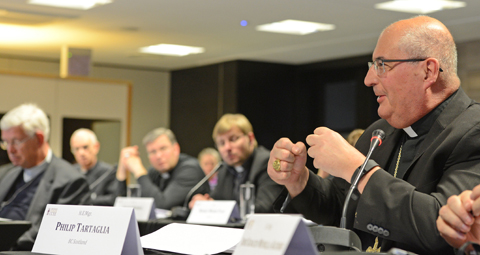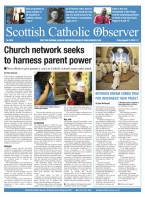BY Ian Dunn | August 11 | ![]() 0 COMMENTS
0 COMMENTS ![]() print
print

Scotland ‘still suspicious of Catholics’
-Archbishop Philip Tartaglia of Glasgow has warned that Scotland still harbours ‘a vague suspicion that Catholics don’t really belong’ and the Church should expect ‘rough treatment’ in the years to come. -By IAN DUNN
The archbishop was speaking in Philadelphia earlier this year to a meeting of priests about the lessons from the Catholic experience in Scotland for Americans, and he called for Scottish Catholics not to shy away from conflict.
“While the old-style religious hostility still exists here and there, it has largely faded, there is still a vague suspicion that Catholics don’t really belong, and if they are there, they should not make too much noise about their Faith,” he said.
He added that after the 1960s, religious belief began to ‘collapse’ in Britian.
“Less than eight per cent of people attend Sunday worship in any week, less than a quarter are members of any Church, and fewer than a tenth of children attend a Sunday school,” he said.
“Fewer than half of couples get married in church, and about a third of couples cohabit without marriage. In England, only a fifth of babies get baptised in the Church of England, and in Scotland one estimate is that only about a fifth are baptised in either the Church of Scotland or the Catholic Church.”
He said this means ‘there has also been a collapse of the basic Christian beliefs and Christian culture that were internalised by nearly all individuals in the UK for centuries, forming their identities whether or not they were churchgoers.’
“Human beings are instinctively religious creatures,” he said. “When we discard one religion, we put another in its place—even if we call it something other than a religion.
“The new ‘religious’ consensus in the UK is a combination of skepticism, consumer appetite, and political intolerance,” he said. “It masks itself with progressive vocabulary, but its targets tend to be practicing Christians.
“Old-fashioned Protestant ‘no Popery here’ slogans may have faded, but today’s discrimination is much more sophisticated. Atheists and secularists in the 1960s and 1970s were content to ignore or mock the Catholic Church, but today many see her as the single most formidable threat to their notions of justice and equality, particularly when it comes to matters of human sexuality.”
The Archbishop continued: “If the Church dissents from today’s new rulebook for the human person—and she must—then she should expect rough treatment.”
He but offered three areas the Church could address, saying that ‘too many believers no longer talk about Jesus winning salvation for the sinful but instead point to him as a moral ideal of what humans should strive for.’
He critiqued ‘chronic sentimentalism in how we deal with moral matters that demand clear, exacting thought.’
Finally, he suggested that too many Catholics ‘accommodate, compromise and avoid conflict—even when conflict is the only proper course.’
“We are too wishy-washy, as we would say in Scotland,” he said. “Once upon a time, Catholics longed for and worked for the conversion of others, including a nation’s cultural elites.
“Now many of our Catholic leaders, intellectuals and academic institutions bend over backwards to assure the gatekeepers of culture and prestige that they’re just as right-thinking as they are.”
He did however say that Christians still matter—‘sometimes decisively’—in the political, economic and social life of the nation.
“Catholics were always a minority, but they were always renewed by immigrants; always building, always growing, never dominant, and never captured by the state.”










